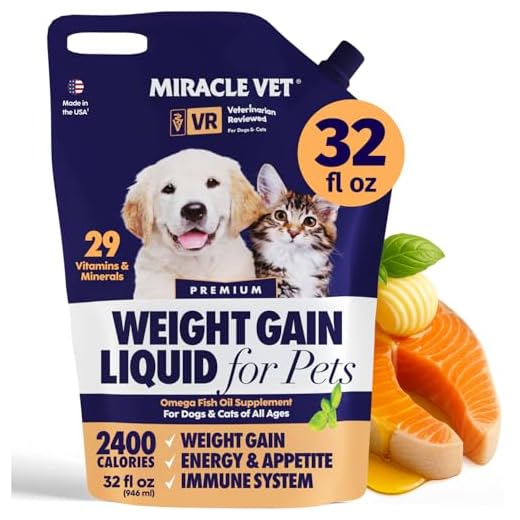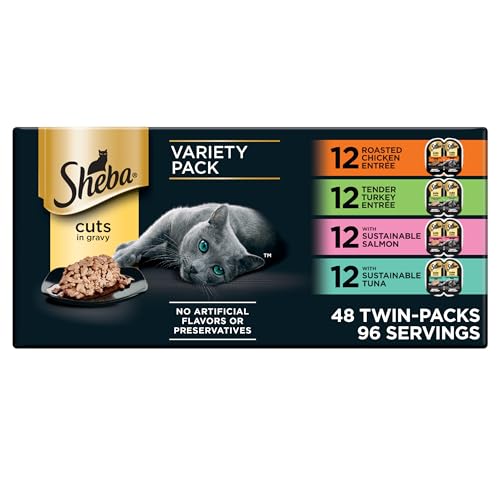



Regular vet check-ups are essential to pinpoint the causes behind my weight loss. As I’ve learned, various health issues can lead to a decrease in appetite or absorption of nutrients, such as kidney disease or hyperthyroidism. If you notice significant weight changes, consulting a veterinarian promptly can help identify any underlying conditions.
Diet plays a crucial role in maintaining a healthy physique. Transitioning to high-quality, calorie-dense food can boost my energy levels and help me regain lost weight. Wet food can be particularly beneficial, as it increases hydration and often appeals more to aging companions. It’s vital to monitor the food intake and adjust accordingly to ensure I’m getting enough nutrition.
Environmental factors can also influence my well-being. Stress from changes in the household, like new pets or moving, can affect my eating habits. Creating a calm and stable environment, with cozy resting spots, can alleviate anxiety and encourage regular eating patterns.
Regular playtime is important too. Engaging in gentle activities stimulates my appetite and keeps my body active. Tailoring play to my energy levels can help maintain a balance between fun and comfort.
Observing behavioral changes is key. If I seem lethargic or disinterested in activities I once enjoyed, it’s a sign that something might be off. Keeping an eye on my behavior and communicating any concerns with a vet can lead to timely interventions.
Understanding Common Health Issues Leading to Weight Loss in Senior Cats
Regular veterinary check-ups are crucial for monitoring the health of mature felines, especially since several conditions can contribute to significant weight loss. Conditions such as hyperthyroidism, diabetes mellitus, and kidney disease are common in senior pets and can lead to a noticeable decrease in body mass. It’s essential to recognize the symptoms early to manage these issues effectively.
Hyperthyroidism
This disorder results from an overproduction of thyroid hormone, often due to a benign tumor. Symptoms include increased appetite combined with weight loss, restlessness, and excessive grooming. If you notice these signs, prompt testing and treatment can help manage the condition and stabilize weight.
Diabetes Mellitus
Diabetes occurs when the body cannot produce enough insulin or respond to it effectively. Common indicators include increased thirst, frequent urination, and weight loss despite a good appetite. A vet can confirm diabetes through blood tests, and treatment often involves insulin therapy and dietary adjustments.
Kidney disease also plays a significant role in weight loss among aging felines. Symptoms often include increased thirst, changes in urination, and a decline in appetite. Regular monitoring and a prescribed diet can support kidney function and help maintain weight. For further insights into health management, check out this link on how much does a cat shed.
Practical Steps to Encourage Healthy Weight Gain in Older Felines
Introduce high-calorie, nutrient-dense foods into the diet. Look for options specifically formulated for senior pets, ensuring they include quality proteins and fats. Brands often label these as “growth” or “performance” formulas.
Incorporate wet food into meals. The moisture content in canned food can aid in hydration while providing more calories. I recommend offering a mix of dry and wet food to maintain variety and appeal.
Enhance Meal Appeal
Consider warming up meals slightly to enhance aroma and make them more enticing. A sprinkle of catnip or a splash of broth can also encourage interest in the food bowl.
Frequent small meals throughout the day can be more appealing than two or three larger servings. This method helps avoid overwhelming your furry friend while ensuring they receive adequate nutrition.
Encourage Activity
Engagement in play is crucial. Use toys that stimulate movement, encouraging exercise while promoting muscle maintenance. Interactive toys or laser pointers can be effective in keeping spirits high and the body active.
Stay updated on food options that suit specific needs, such as how to get cat food cyberpunk, which may offer unique formulations that cater to older felines.
Regular vet check-ups are essential to pinpoint the causes behind my weight loss. As I’ve learned, various health issues can lead to a decrease in appetite or absorption of nutrients, such as kidney disease or hyperthyroidism. If you notice significant weight changes, consulting a veterinarian promptly can help identify any underlying conditions.
Diet plays a crucial role in maintaining a healthy physique. Transitioning to high-quality, calorie-dense food can boost my energy levels and help me regain lost weight. Wet food can be particularly beneficial, as it increases hydration and often appeals more to aging companions. It’s vital to monitor the food intake and adjust accordingly to ensure I’m getting enough nutrition.
Environmental factors can also influence my well-being. Stress from changes in the household, like new pets or moving, can affect my eating habits. Creating a calm and stable environment, with cozy resting spots, can alleviate anxiety and encourage regular eating patterns.
Regular playtime is important too. Engaging in gentle activities stimulates my appetite and keeps my body active. Tailoring play to my energy levels can help maintain a balance between fun and comfort.
Observing behavioral changes is key. If I seem lethargic or disinterested in activities I once enjoyed, it’s a sign that something might be off. Keeping an eye on my behavior and communicating any concerns with a vet can lead to timely interventions.
Understanding Common Health Issues Leading to Weight Loss in Senior Cats
Regular veterinary check-ups are crucial for monitoring the health of mature felines, especially since several conditions can contribute to significant weight loss. Conditions such as hyperthyroidism, diabetes mellitus, and kidney disease are common in senior pets and can lead to a noticeable decrease in body mass. It’s essential to recognize the symptoms early to manage these issues effectively.
Hyperthyroidism
This disorder results from an overproduction of thyroid hormone, often due to a benign tumor. Symptoms include increased appetite combined with weight loss, restlessness, and excessive grooming. If you notice these signs, prompt testing and treatment can help manage the condition and stabilize weight.
Diabetes Mellitus
Diabetes occurs when the body cannot produce enough insulin or respond to it effectively. Common indicators include increased thirst, frequent urination, and weight loss despite a good appetite. A vet can confirm diabetes through blood tests, and treatment often involves insulin therapy and dietary adjustments.
Kidney disease also plays a significant role in weight loss among aging felines. Symptoms often include increased thirst, changes in urination, and a decline in appetite. Regular monitoring and a prescribed diet can support kidney function and help maintain weight. For further insights into health management, check out this link on how much does a cat shed.
Practical Steps to Encourage Healthy Weight Gain in Older Felines
Introduce high-calorie, nutrient-dense foods into the diet. Look for options specifically formulated for senior pets, ensuring they include quality proteins and fats. Brands often label these as “growth” or “performance” formulas.
Incorporate wet food into meals. The moisture content in canned food can aid in hydration while providing more calories. I recommend offering a mix of dry and wet food to maintain variety and appeal.
Enhance Meal Appeal
Consider warming up meals slightly to enhance aroma and make them more enticing. A sprinkle of catnip or a splash of broth can also encourage interest in the food bowl.
Frequent small meals throughout the day can be more appealing than two or three larger servings. This method helps avoid overwhelming your furry friend while ensuring they receive adequate nutrition.
Encourage Activity
Engagement in play is crucial. Use toys that stimulate movement, encouraging exercise while promoting muscle maintenance. Interactive toys or laser pointers can be effective in keeping spirits high and the body active.
Stay updated on food options that suit specific needs, such as how to get cat food cyberpunk, which may offer unique formulations that cater to older felines.
Regular vet check-ups are essential to pinpoint the causes behind my weight loss. As I’ve learned, various health issues can lead to a decrease in appetite or absorption of nutrients, such as kidney disease or hyperthyroidism. If you notice significant weight changes, consulting a veterinarian promptly can help identify any underlying conditions.
Diet plays a crucial role in maintaining a healthy physique. Transitioning to high-quality, calorie-dense food can boost my energy levels and help me regain lost weight. Wet food can be particularly beneficial, as it increases hydration and often appeals more to aging companions. It’s vital to monitor the food intake and adjust accordingly to ensure I’m getting enough nutrition.
Environmental factors can also influence my well-being. Stress from changes in the household, like new pets or moving, can affect my eating habits. Creating a calm and stable environment, with cozy resting spots, can alleviate anxiety and encourage regular eating patterns.
Regular playtime is important too. Engaging in gentle activities stimulates my appetite and keeps my body active. Tailoring play to my energy levels can help maintain a balance between fun and comfort.
Observing behavioral changes is key. If I seem lethargic or disinterested in activities I once enjoyed, it’s a sign that something might be off. Keeping an eye on my behavior and communicating any concerns with a vet can lead to timely interventions.
Understanding Common Health Issues Leading to Weight Loss in Senior Cats
Regular veterinary check-ups are crucial for monitoring the health of mature felines, especially since several conditions can contribute to significant weight loss. Conditions such as hyperthyroidism, diabetes mellitus, and kidney disease are common in senior pets and can lead to a noticeable decrease in body mass. It’s essential to recognize the symptoms early to manage these issues effectively.
Hyperthyroidism
This disorder results from an overproduction of thyroid hormone, often due to a benign tumor. Symptoms include increased appetite combined with weight loss, restlessness, and excessive grooming. If you notice these signs, prompt testing and treatment can help manage the condition and stabilize weight.
Diabetes Mellitus
Diabetes occurs when the body cannot produce enough insulin or respond to it effectively. Common indicators include increased thirst, frequent urination, and weight loss despite a good appetite. A vet can confirm diabetes through blood tests, and treatment often involves insulin therapy and dietary adjustments.
Kidney disease also plays a significant role in weight loss among aging felines. Symptoms often include increased thirst, changes in urination, and a decline in appetite. Regular monitoring and a prescribed diet can support kidney function and help maintain weight. For further insights into health management, check out this link on how much does a cat shed.
Practical Steps to Encourage Healthy Weight Gain in Older Felines
Introduce high-calorie, nutrient-dense foods into the diet. Look for options specifically formulated for senior pets, ensuring they include quality proteins and fats. Brands often label these as “growth” or “performance” formulas.
Incorporate wet food into meals. The moisture content in canned food can aid in hydration while providing more calories. I recommend offering a mix of dry and wet food to maintain variety and appeal.
Enhance Meal Appeal
Consider warming up meals slightly to enhance aroma and make them more enticing. A sprinkle of catnip or a splash of broth can also encourage interest in the food bowl.
Frequent small meals throughout the day can be more appealing than two or three larger servings. This method helps avoid overwhelming your furry friend while ensuring they receive adequate nutrition.
Encourage Activity
Engagement in play is crucial. Use toys that stimulate movement, encouraging exercise while promoting muscle maintenance. Interactive toys or laser pointers can be effective in keeping spirits high and the body active.
Stay updated on food options that suit specific needs, such as how to get cat food cyberpunk, which may offer unique formulations that cater to older felines.












